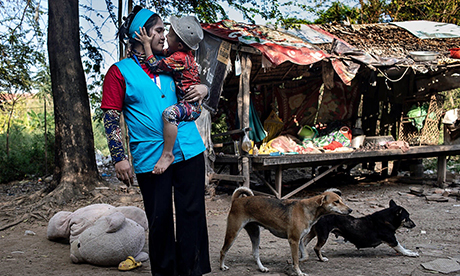The baby was not hers, not really.
Hun Daneth felt that, counted on that.
When she gave birth to the boy, who didn’t look like her, she knew it even more.
But four years after acting as a surrogate for a Chinese businessman, who said he had used a Russian egg donor, Ms Hun Daneth is being forced by the Cambodian courts to raise the little boy or risk going to jail.
The businessman is in prison over the surrogacy; his appeal was denied in June.
Even as she dealt with the shock of raising the baby, Ms Hun Daneth dutifully changed his diapers.
Over the months and years, she found herself hugging and kissing him, cajoling him to eat more rice so he could grow big and strong. She has come to see this child as her own.
“I love him so much,” said Ms Hun Daneth, who is looking after the boy with her husband.
The fates of a Cambodian woman, a Chinese man and the boy who binds them together reflect the intricate ethical dilemmas posed by the global surrogacy industry.
The practice is legal — and often prohibitively expensive — in some countries, while others have outlawed it.
Still, other nations with weak legal systems, like Cambodia, have allowed grey markets to operate, endangering those involved when political conditions suddenly shift and criminal cases follow.
When carried out transparently with safeguards in place, supporters say, commercial surrogacy allows people to expand their families while fairly compensating the women who give birth to the children.
Done badly, the process can lead to the abuse of vulnerable people, whether the surrogates or the intended parents.
The practice flourishes in the nebulous space between those who can and cannot bear children; between those with the means to hire someone to bear their biological offspring and the women who need the money; and between those whose sexuality or marital status means they can’t adopt or otherwise become parents and those whose fertility spares them having to face such restrictions.
Though she never intended to raise the boy, Ms Hun Daneth has come to see him as her own. “I love him so much,” she said.
As the industry flourished, the government imposed a ban on surrogacy, promising to pass legislation officially outlawing it.
The ill-defined injunction, imposed in a graft-ridden country with little rule of law, ended up punishing the very women the government had vowed to safeguard.
In 2018, Ms Hun Daneth was one of about 30 surrogates, all pregnant, who were nabbed in a police raid on an upmarket housing complex in Phnom Penh. Although Cambodia to this day has no law specifically limiting surrogacy, the government criminalized the practice by using existing laws against human trafficking, an offence that can carry a 20-year sentence. Dozens of surrogates have been arrested and accused of trafficking the babies they birthed.
In a poor country long used as a playground by foreign predators — paedophiles, sex tourists, factory bosses, antique smugglers and, yes, human traffickers — the Cambodian authorities said they were on the lookout for exploitation.
“Surrogacy means women are willing to sell babies, and that counts as trafficking,” said Chou Bun Eng, a secretary of state at the ministry of interior and vice chair of the national countertrafficking committee.
“We do not want Cambodia to be known as a place that produces babies to buy.”
But applying a human trafficking law to surrogacy has imposed the heaviest costs on the surrogates themselves.
Nearly all of those arrested in the 2018 raid gave birth while imprisoned in a military hospital; some chained to their beds.
They, along with several surrogacy agency employees, were convicted of trafficking the babies.
Their sentencings, two years later, came with a condition: In exchange for suspended prison terms, the surrogates would have to raise the children themselves. If the women secretly tried to deliver the children to the intended parents, the judge warned, they would be sent to prison for many years.
This means that women whose financial precarity led them to surrogacy are now struggling with one more mouth to feed.
From behind the bars of a courthouse in Phnom Penh, Xu Wenjun, the intended father of the boy to whom Ms Hun Daneth gave birth, spoke quickly, his words tumbling out before the police intervened. He has been in prison for three years.
“My son must be big by now,” said Mr Xu, dressed in an orange prison jumpsuit.
“Do you think he remembers me?” Continue reading
